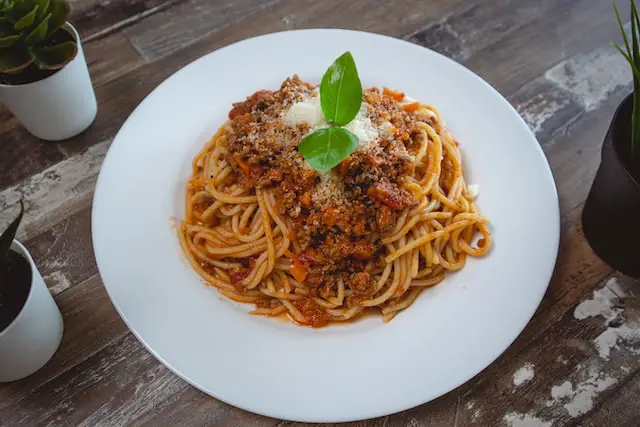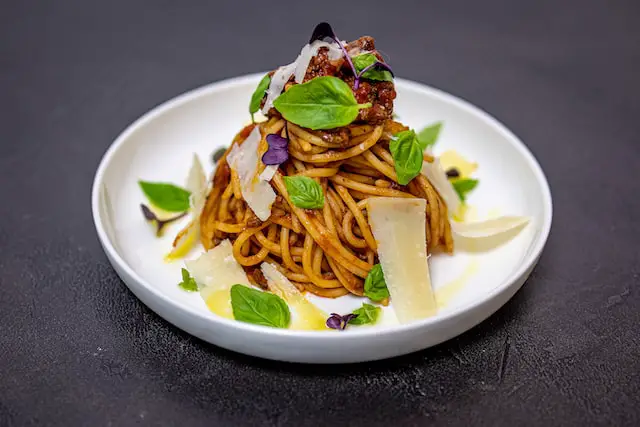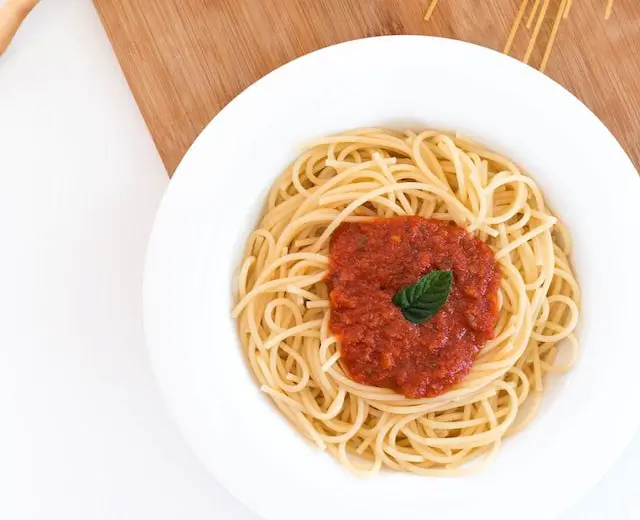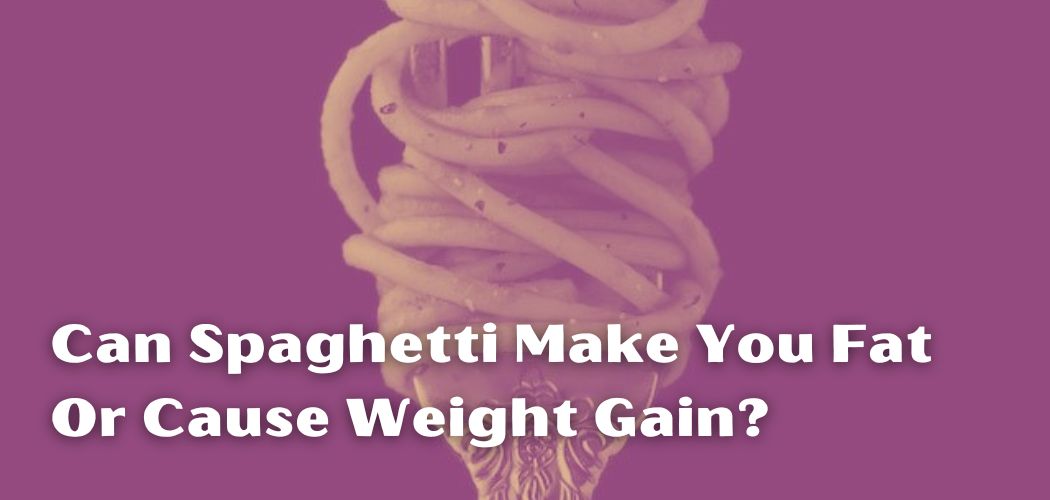Spaghetti is the archetypal Italian pasta. It is produced from durum wheat semolina and is long, like a string (thus the name, since Spago means string).
Generally, commercial variations are utilized, but handcrafted variants are readily available. This is the most well-known pasta shape in the world, with practically identical names in all languages.

Spaghetti is served with a variety of sauces, including the traditional carbonara, ragù, and seafood sauces.
They are boiled in boiling water for eight to fourteen minutes (depending on thickness), then drained and served with the desired sauce.
Typically, they are prepared “risotto-style,” which means they are drained a few minutes before completion and then let to finish cooking in the pan with the sauce. This improves the pasta’s ability to retain sauce and produces a creamier spaghetti.
Intake of Dietary Fat & Fiber
Even though a few grams of fiber may seem insignificant, the majority of individuals do not consume enough of this vitamin.
According to a renowned journal, the average American consumes dietary fiber of 15 grams per day instead of the recommended intake of 30 grams.
Because the majority of individuals do not ingest enough fiber, every additional gram counts. Therefore, whole-grain items, such as pasta, are always more nutritious than refined products.
According to a renowned public health sector, ingestion of dietary fiber can reduce the risk of diabetes, diverticular disorders and cardiovascular disease.
Additionally, according to the FDA, dietary fiber promotes regular bowel motions and healthy blood sugar levels.

The fiber also increases satiety and digestion, altering the absorption of cholesterol and fat into circulation. Each and every variable can contribute to weight gain.
To consume pasta with the least amount of fat, cook whole-grain spaghetti with sauces like pesto, tomato sauce, etc. These vegetable sauces are one of the healthiest options for your health.
Avoid high-saturated-fat sauces, such as garlic butter sauce, alfredo sauce and other creamy, white sauces. The amount of saturated fat present in these sauces can contribute to more than only a gain in weight.
According to a health journal, it can also increase your triglyceride and cholesterol levels, so increasing your risk of stroke and cardiovascular disease.
Is It Fattening?
Spaghetti is the number one adversary of many dieters, but a recent study from Italian researchers suggests that this hatred is unnecessary.
Pasta eaters really have a lower body mass index and a smaller waist-to-hip ratio. This study does not, however, provide unlimited access to the pasta buffet. Moderation and intelligent decision-making are essential.
This type of pasta has been shunned by overeager dieters, slandered by self-proclaimed nutritionists, and demonized by the carb-averse, but it is finally experiencing a moment of redemption.
According to a new study published this week in the nutritional journal, pasta may not be the dietary foe that many people consider it to be. According to the study, pasta may help you lose weight.
Another nutritionist stated that “By studying the anthropometric data of the individuals and their eating habits, we found that pasta consumption, contrary to popular belief, is not connected with an increase in body weight, but rather the opposite.”
Researchers from one of the renowned institutes in Italy analyzed two significant trials including over 23,000 participants. Pasta eaters had a lower body mass index (BMI), waist circumference, and waist-to-hip ratio.
Pasta is a staple of the well-praised Mediterranean diet, thus it stands to reason that pasta may be included. The traditional Italian diet is abundant in heart-healthy fats derived from fish and olive oil, as well as vegetables, fruits, pasta and whole grains.

According to an expert nutritionist, pasta is commonly viewed as insufficient for weight loss. And other individuals prohibit it entirely from their diets. Based on this research, we may conclude that this mindset is incorrect.
But do not rush to prepare a large serving of spaghetti for dinner tonight. It is unclear how these findings pertain to the diets of Americans.
In any case, the research was conducted in Italy, where the diet is more highly influenced by the Mediterranean diet. Their nutrition is fundamentally distinct from that of the average American.
In fact, researchers discovered those study participants who consumed pasta also consumed greater quantities of onions, tomato sauce, tomatoes and garlic, seasoned cheese, rice, and olive oil, all of which are essential components of the Mediterranean diet.
Whole-Grain & Refined Pasta
Pasta contains little fat, although it can be fattening. It is largely regarded as fattening due to its high carbohydrate content.
According to the USDA, one cup of ordinary pasta contains almost 196 calories (124 grams). Additionally, pasta has 7 grams of protein in addition to 1 gram of fat and 38 grams of carbohydrates.
Mostly regular spaghetti is refined, which means that each cup has only 2 grams of nutritional fiber.
For instance, whole grain pasta contains 174 calories per cup. Whole-grain pasta also contains 35.2 grams of carbohydrates, 2 grams of fat and 7 grams of protein. Whole grain spaghetti contains greater nutritional fiber, with 4.6 grams per cup.
Both whole grain and refined pasta includes a number of vital elements. Normal pasta is often fortified, similar to other refined foodstuffs. However, whole-grain pasta has greater quantities of phosphorus, magnesium, copper, selenium, manganese, and zinc.
Conclusion
It was found that people lost more weight on the low-glycemic diet with spaghetti, and that pasta itself did not cause weight gain or increases in body fat.
You might want to start preparing your own Alfredo sauce at home before you celebrate and indulge in a restaurant’s version. This is because restaurant pasta typically contains excessive salt and fatty sauces, which are unhealthy when consumed daily.
Moderation is essential. Whole-grain pasta will improve your health since it contains “healthy” iron, carbohydrates, fiber, and other essential minerals and vitamins.
So, based on all the information given above spaghetti alone wouldn’t make you fat but avoid adding excessive amounts of cheese and limit pasta servings to one cup. Add your favorite vegetables and protein-rich foods to improve the flavor and nutritional value.
